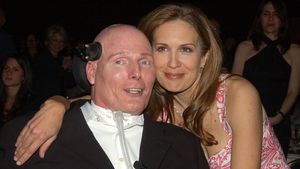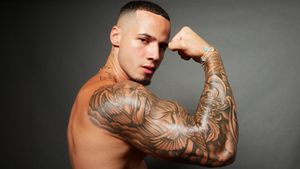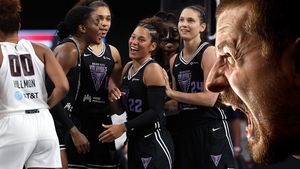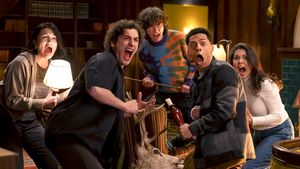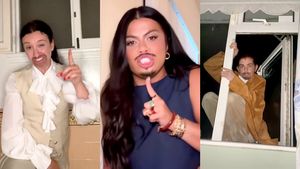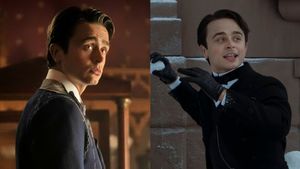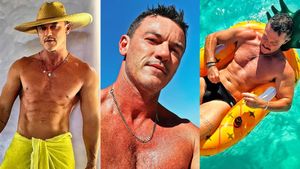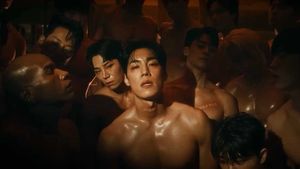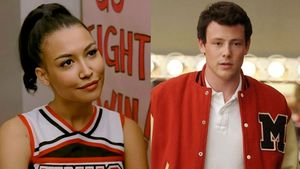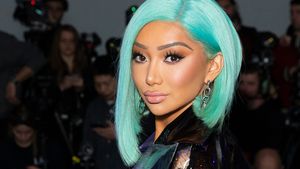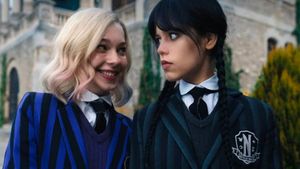A teen singer and one of the originators of the women's music movement in the 1970s, Holly Near is back with an immense new two-disc album called Peace Becomes You, which includes contributions from 22 different musicians, her own famed songwriting, as well as material written or sung by artists including Irving Berlin, Ferron, Gnarls Barkley, Cris Williamson, and Keb' Mo'. It's an amazing triumph but the legendary Near, whose legacy goes beyond music to LGBT activism, is more surprised by what's been accomplished around her.
The Advocate: I was just on the Olivia 40th Anniversary cruise where many great early women musicians performed, including Cris Williamson and Meg Christian, an ex of yours who's been on an ashram for 30 years, I think. You too were one of the founders of the women's music movement. What's that legacy mean to you now?
Holly Near: I am very moved by the legacy and take it seriously. There were lesbians and feminists doing music all over the country and the world. We didn't all know each other, but each one of us skipped a stone and the ripples began. If I had been asked in 1975 if I thought we would soon have out lesbian singers and comedians working in the music industry, winning Grammys, showing up at events with our sweethearts, producing and directing films with positive lesbian images that are distributed by Hollywood companies, seeing gay characters on many TV sitcoms, having gay people in Congress and legislatures and on the bench, having out professional athletes, experiencing marriage equality, and on and on -- well, I would have been happy with the fantasy, but I'm not sure I would have believed it possible in such a short amount of time. It is worth pausing to celebrate. I believe the songs we wrote and sang that traveled around the world contributed a great deal to the achievements of the past 40 plus years, not only regarding sexuality and gender but race and class and disability, in all the ways women struggle when they fall in love with one another.
 At left: Near as a teenager
At left: Near as a teenager
I'm interested in how your work has changed as you've gotten older. We talk about how being a woman over 30 in many entertainment fields sort of renders you invisible. What's your experience in music been?
I have become a better singer, a more informed critical thinker. I wish I had had this kind of wisdom and vocal maturity in the '80s, when I had the largest audience. But that is OK. Those who have hung in there with me and those just discovering the work, they get to experience the benefits. I no longer need to be in the center of attention. It is quite peaceful. There are women just coming into their own who did not have opportunities in their younger years and now, just when they are finding the free time to be creative, they feel invisible. It is too bad that society does not realize what can be gained by working with mature women. But for me, I saw the invisibility happen to women older than me, so I had time to prepare.
At right: Near in 1972
There's such an interesting collection of contributions to the new album, Peace Becomes You, since it includes your own songwriting as well as material written or sung by artists including Irving Berlin, Ferron, Gnarls Barkley, Cris Williamson, and Keb' Mo'. Honestly, Gnarls Barkley was a surprise. Tell me about that.
I have never been comfortable with boxes and identities. I grew up listening to so many styles of music, so it has always been toxic to me when asked what kind of music I do. Is it folk? Pop? Musical theater? I don't think it is any of that standing alone. It is a fusion of styles. The element that holds the work together is that the songs tell a story and each song is sung by the suitable character to tell that story. I work diligently to choose or write material that doesn't unfold at the expense of another. Once I find the heart of the matter, then the musical style and arrangement becomes clear. I love working this way, even though it has made it a bit of a nightmare for the promotion department.
 Included above: Lily Tomlin, Holly Near, Cris Williamson, Meg Christian, Margie Adam and the members of the Alice Stone Ladies Society Orchestra
Included above: Lily Tomlin, Holly Near, Cris Williamson, Meg Christian, Margie Adam and the members of the Alice Stone Ladies Society OrchestraIn all, you worked with 22 different musicians on the album. Is that a record for you?
Probably. It is a two-CD collection. so it is a bit unfair to compare them to single CD projects. But it was wonderful. And I love to hire musicians and pay them. Musicians are so often underappreciated. When I produce a CD, I intentionally hire people who have ideas. I don't just hand them a chart and tell them what to play. I tell them the story of the song, the history, the intent, then I invite them to bring to the table what they are so good at doing, which is playing their particular instrument. I sit close to them and offer some direction as a director would give an actor. Then I step back and enjoy.
 You came out as a lesbian in 1976 and were probably the first out lesbian in People magazine. But you were later in a long-term relationship with a man. How do you identify yourself now? Or are you just beyond identity politics?
You came out as a lesbian in 1976 and were probably the first out lesbian in People magazine. But you were later in a long-term relationship with a man. How do you identify yourself now? Or are you just beyond identity politics?I'm comfortable with all the ways in which we can be as long as it is nonviolent. Identity is an interesting thing. It is important to use words like
lesbian and
transgender for as long as people are being killed for those names. Just as it has been important to use words like
black and
Chicano and
Arab and
indigenous and
Hawaiian. There are many reasons to identify when one's legal rights are challenged and one's very being is insulted. We need to keep using the words until the sting and the danger subsides. I used the word
lesbian whenever possible when I first came out -- even in countries where the interpreters didn't have a translation for the word. Using the word opened up important conversations and brought homophobia to the surface. Personally? When I think of my various identities, I think of feminist, artist, global peace activist, elder-in-training, and if I were partnered with a woman, then
lesbian would be one of those identities. However, I doubt I would partner with a lesbian who wasn't a woman-identified feminist. When I was with a man, I did not think of myself as straight or bisexual. I thought of myself as woman-identified and monogamous. I'm no longer partnered, but I have friends so it is hard to call myself single. I find words to be very tricky. Maybe someday a word will come along that has my name on it. But regardless, I have been very much a part of the lesbian community since the early '70s. I can't imagine myself without the lesbian community. So, what do we call that? I don't have the words. Maybe it is called love.
 Arlo Guthrie, Ronnie Gilbert, Holly Near, and Pete Seeger
Arlo Guthrie, Ronnie Gilbert, Holly Near, and Pete SeegerDo you think people are getting more understanding of sexual fluidity? I mean in the 1990s. I felt like you -- and other lesbians that fell in love with a man. like JoAnn Loulan -- were crucified for loving a man.
I don't blame anyone for their confusion. I had plenty of my own. Women came out to my songs, they looked to me for leadership, and in the beginning you could count on one hand the number of nationally known out lesbian artists. Literally, one hand -- and still have your thumb free! So if they thought one of those leaders was going to betray them, they got scared. But over time, they saw I had not betrayed. I still stood on the front lines. I still sang lesbian songs. I still advocated for lesbian rights and cultural support. I think we are fine now. Trust takes time.
Your songs are still often gender-neutral, though. Is that a commitment to LGBT listeners?
Yes. It gives room for all the different ways in which we love. If I use a gender, I tend to use she.
 Janis Ian, Ronnie Gilbert (one of the original members of the Weavers), Holly Near, and Odetta
Janis Ian, Ronnie Gilbert (one of the original members of the Weavers), Holly Near, and Odetta
You have dozens of albums to your name. What's different about Peace Becomes You?
Still me. Just older and wiser.
You used to act. Heck, you were in Mod Squad and Slaughterhouse-Five. Why'd you stop?
Hollywood is a tough town to come and go from. For auditions, one often has a few hours' notice. I felt I either had to dig in and make that my life and career or not. I chose the not. But if anyone ever wants me to come do more acting, I am totally open. I love working in film and TV.
 River Phoenix, Holly Near, and Lili Taylor in
River Phoenix, Holly Near, and Lili Taylor in Dogfight
This is a great year for LGBT issues. The Supreme Court is debating same-sex marriage, we have more visibility and acceptance than ever before. What are you most proud of?I'm proud of the hundreds of thousands of people who came out to their family, their friends, their coworkers, and little by little, the fear turned to love or even disinterest. When I came out and it was in the newspapers, my mom intentionally went down into the center of our little town and just walked around. She said, "I just wanted to be there in case anybody had anything to say." I loved that. There she was, available to chat and to listen. My mom always listened first. My parents were fascinated by people and ideas. When I was doing the Women on Wheels Tour in the early '70s, which was a mostly lesbian musicians' tour in California, we presented a mixed concert and a women-only concert. My dad and mom came to the mixed concert together, and then Dad waited in the car so Mom could go to the women-only one. He just wasn't afraid of people's joy. But if you hit a child or used racist language, he became angry. He didn't like meanness.
Watch the video below of Holly Near in concert with Jeff Langley in 1976.


 At left: Near as a teenager
At left: Near as a teenager






























